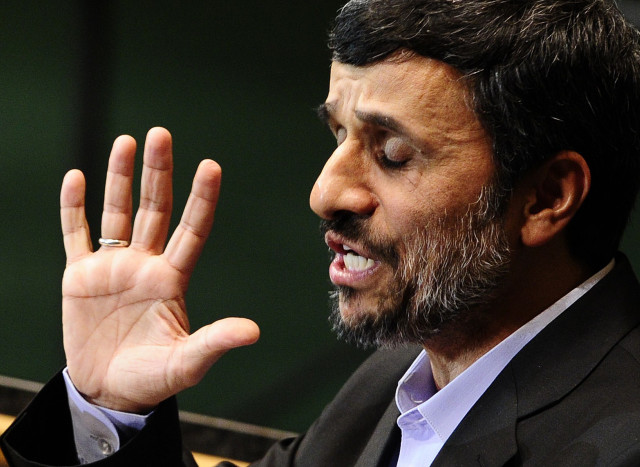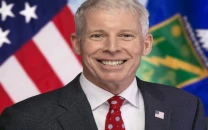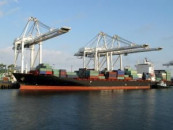US delegation walks out of Ahmadinejad's UN speech
Ahmadinejad's 9/11 remarks lead to Western nations staging a walkout at the United Nations General Assembly.

US delegation walks out of Ahmadinejad's UN speech
Two US officials, who had been watching the speech, led the protest and the British and other European Union delegations quickly followed after Ahmadinejad said most Americans believed their government was involved in the 2001 attacks.
The Iranian president said there was a theory that "some segments within the US government orchestrated the attack to reverse the declining American economy and its grips on the Middle East, in order also to save the Zionist regime.
"The majority of the American people as well as other nations and politicians agree with this view," he declared to the astonished chamber.
The US mission furiously slammed the Iranian leader in a statement released even before Ahmadinejad had finished speaking. "Rather than representing the aspirations and goodwill of the Iranian people, Mr Ahmadinejad has yet again chosen to spout vile conspiracy theories and anti-Semitic slurs that are as abhorrent and delusional as they are predictable," said Mark Kornblau, US mission spokesman.
Canada's Foreign Minister Lawrence Cannon called Ahmadinejad's comments "a blatant violation of international standards and of the very spirit of the UN."
The European Union said that Ahmadinejad's comments were "outrages and unacceptable". "It is for this reason that all representatives of the 27 nations of the EU walked out," she underlined, after Europe joined a US-led Western walkout in Manhattan.
History of controversy
The Iranian leader has frequently courted controversy at the UN General Assembly. Last year there was a walkout after his comments about Israel. This year's speech also included attacks on Israel, whom he called "the Zionists".
He criticised the world powers for trying to halt Iran's nuclear program. Ahmadinejad accused them of monopolising nuclear power while "they have continued to maintain, expand and upgrade their own nuclear arsenals."
He said that 2011 should be declared a year of nuclear disarmament -- "Nuclear Energy for All, Nuclear Weapons for None."
Western nations accuse Iran of seeking a nuclear weapon and the United Nations has imposed four rounds of sanctions against the Islamic Republic. But Obama told the General Assembly earlier that there could still be a negotiated settlement. "The door remains open to diplomacy should Iran choose to walk through it. But the Iranian government must demonstrate a clear and credible commitment, and confirm to the world the peaceful intent of its nuclear program," he told world leaders.
Middle East peace process
Obama concentrated his speech on an appeal for support for his efforts to end the Middle East peace deadlock, warning that "more blood will be shed" if it fails. He said there was a once-in-a-generation opportunity to create a Palestinian state if key nations in the region and world powers throw their weight behind his new drive. He was backed by UN Secretary General Ban Ki-moon who said there was "encouraging movement toward a comprehensive peace".
Obama said if Israeli-Palestinian talks were successful, "when we come back here next year, we can have an agreement that will lead to a new member of the United Nations -- an independent state of Palestine, living in peace with Israel."
Palestinian president Mahmud Abbas and Israeli Prime Minister Benjamin Netanyahu have held two rounds of new talks, with US help, in the past month. But Abbas has threatened to walk out if Israel does not extend a moratorium on building new settlements in the occupied West Bank. Obama renewed US calls for the moratorium to be extended.
The US president acknowledged pessimism about the talks. "But consider the alternative. If an agreement is not reached, Palestinians will never know the pride and dignity that comes with their own state." "Israelis will never know the certainty and security that comes with sovereign and stable neighbours who are committed to co-existence." He warned that if the talks collapse, hopes of peace may founder for a generation. "More blood will be shed. This Holy Land will remain a symbol of our differences, instead of our common humanity," Obama said.



















COMMENTS
Comments are moderated and generally will be posted if they are on-topic and not abusive.
For more information, please see our Comments FAQ